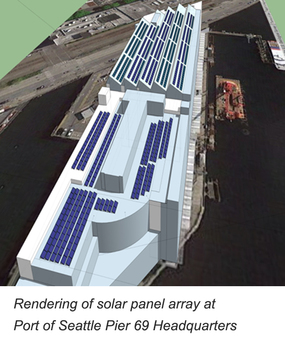
The Port of Seattle Commissioners took action today (3/27/18) to create its 2018 Energy and Sustainability Committee and identify top environmental priorities to reduce greenhouse gas emissions and further innovative collaborations to protect the air and water quality of surrounding communities. Co-chaired by Commissioners Fred Felleman and Ryan Calkins, the Committee develops policy recommendations and provides oversight of strategic conservation decisions the Port will make in 2018 and 2019. These efforts are designed to further the Port’s Century Agenda’s goal to “be the greenest and most energy-efficient Port in North America” and “meet all increased energy needs through conservation and renewable sources.”
“The Port is making good on its promises to protect the environment both locally and globally. It’s our commitment to improve both the health and wealth of our communities,” Commissioner Felleman said. “We appreciate the work of the many agency, industry, community and environmental advisors who provided invaluable assistance in developing our goals.”
“As the Port grows, we will continue to be sensitive to the needs of our neighboring communities, both for a healthy environment and for stable, good-paying jobs. We have made great progress on environmental impacts, but there is much more work to do,” said Commissioner Ryan Calkins.
The Energy and Sustainability Committee outlined four specific priorities in its work plan: advancing the use of Sustainable Aviation Fuels, launching an aquatic carbon sequestration, “Blue Carbon,” strategy, establishing a Sustainable Evaluation Framework for project reviews and updating the Port’s environmental awards.

- The Chairs will oversee the development of a Sustainable Aviation Fuels implementation strategy. Regionally produced sustainable Aviation Fuels is a major way the Port can reduce community impacts and greenhouse gases.
- The Port will support collaboration with the University of Washington and others in the development of an aquatic carbon sequestration pilot project. The Blue Carbon pilot project will break ground this year at T-91 near Magnolia and could inform the degree to which habitat restoration projects can also sequester greenhouse gases.
- The Commission authorized the Executive Director to enter into a Memorandum of Understanding (MOU) with King County to become a member of the King County-Cities Climate Collaboration (K4C) - the first non-city government to join the coalition. The mission of K4C is to support and enhance projects and programs in focus areas such as green building, using and producing renewable energy, sustainability outreach and education, and alternative transportation.The development of a Sustainable Project Framework was proposed by the 2016 Energy and Sustainability Committee, chaired by Commissioners Fred Felleman and Courtney Gregoire. This Framework will assist the Commission in making decisions on projects in a transparent manner that explicitly reviews the environmental, social, and financial tradeoffs that occur in any project of significance.
- The Committee will recommend four pilot projects to develop the Framework, and approve the installation of a solar array on the Port headquarters at Pier 69.
- The Committee shall update the Port’s environmental awards program engages Port stakeholders and elevates public awareness of the innovation that permeates our maritime, aviation and community partners.
Environmental Accomplishments under the 2016 Charter
- The Port Commission passed a motion calling for the use of 10% regionally produced Sustainable Aviation Fuels (SAF) at Sea-Tac within ten years. The Commission went on to call for the development of a strategy how to attain that goal as part of its SLOA gate allocation agreement with the airlines, becoming the first airport to pursue such a strategy.
- The Port Commission passed a motion in April 2017 that aligned its GHG reduction goals with those of other governments in the region which were more stringent, making it possible for the Port to collaborate with K4C and become the first non-city government to join the coalition.
- The Port Commission passed a motion in November 2017 to support the Committee’s recommendations that included support for two additional environmental staff, a budget for an environmental consultant, and detailed steps the Port will take to reach the new near-term and more stringent GHG reduction goals.
- The Commission secured $1 million in the Port’s budget for matching grants and to leverage GHG reduction and other collaborative environmental initiatives.
- The Port installed a solar array on a building at Fishermen’s Terminal (King 5 News Coverage) and is reviewing bids to install a second array on the roof of its Pier 69 headquarters this summer.
- The Commission directed staff to develop a Sustainability Evaluation Framework that gives commissioners the tools to transparently weigh the social, environmental and financial implications of projects under consideration for approval. The development of the Framework will be guided by four pilot projects, two at the airport and two in maritime.
The Port’s commitment to reduce its greenhouse gas and other emissions is documented in the recent publication of its 2016 Air Emission Inventory. Due to efforts by the Port, in partnership with other ports, government agencies, and industrial partners between 2005 and 2016 there was a 72 percent reduction in diesel particulate matter and 10 percent reduction in CO2e emissions associated with maritime-related activities during this period of significant economic growth

